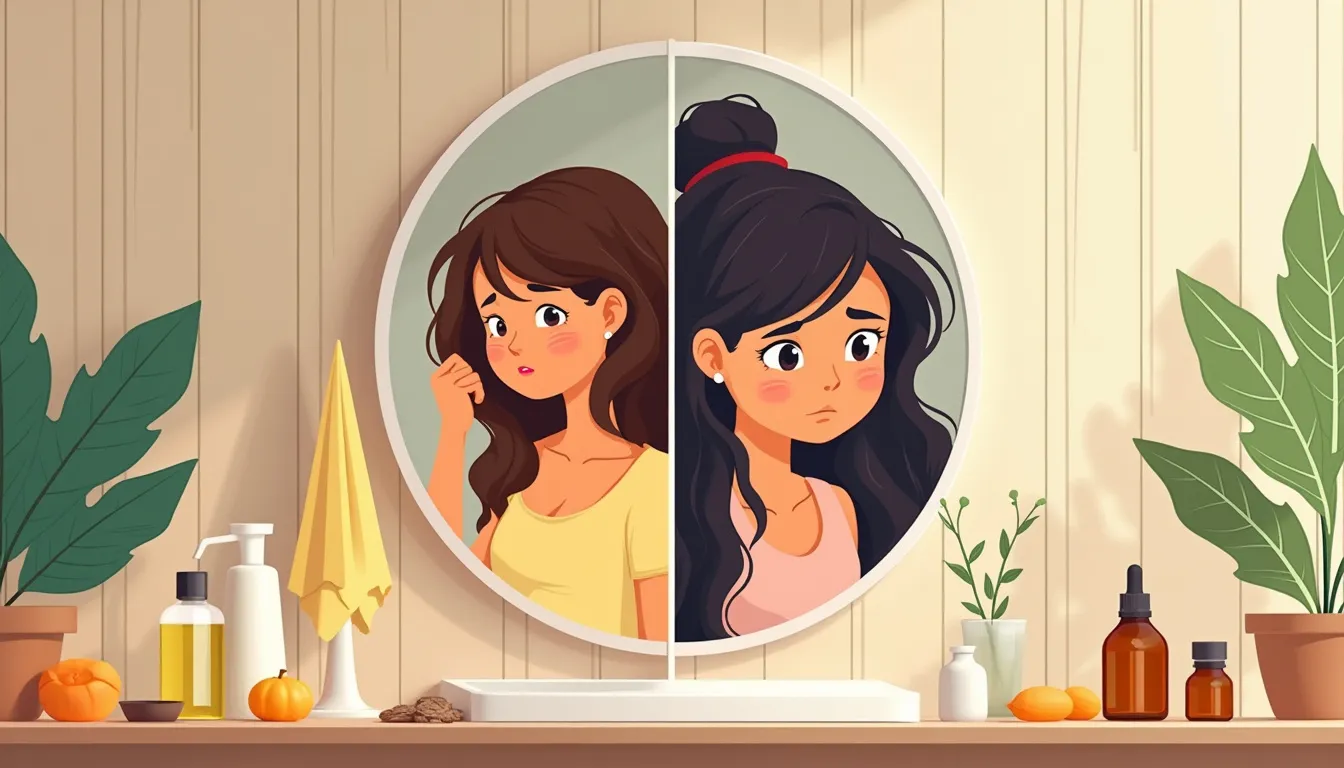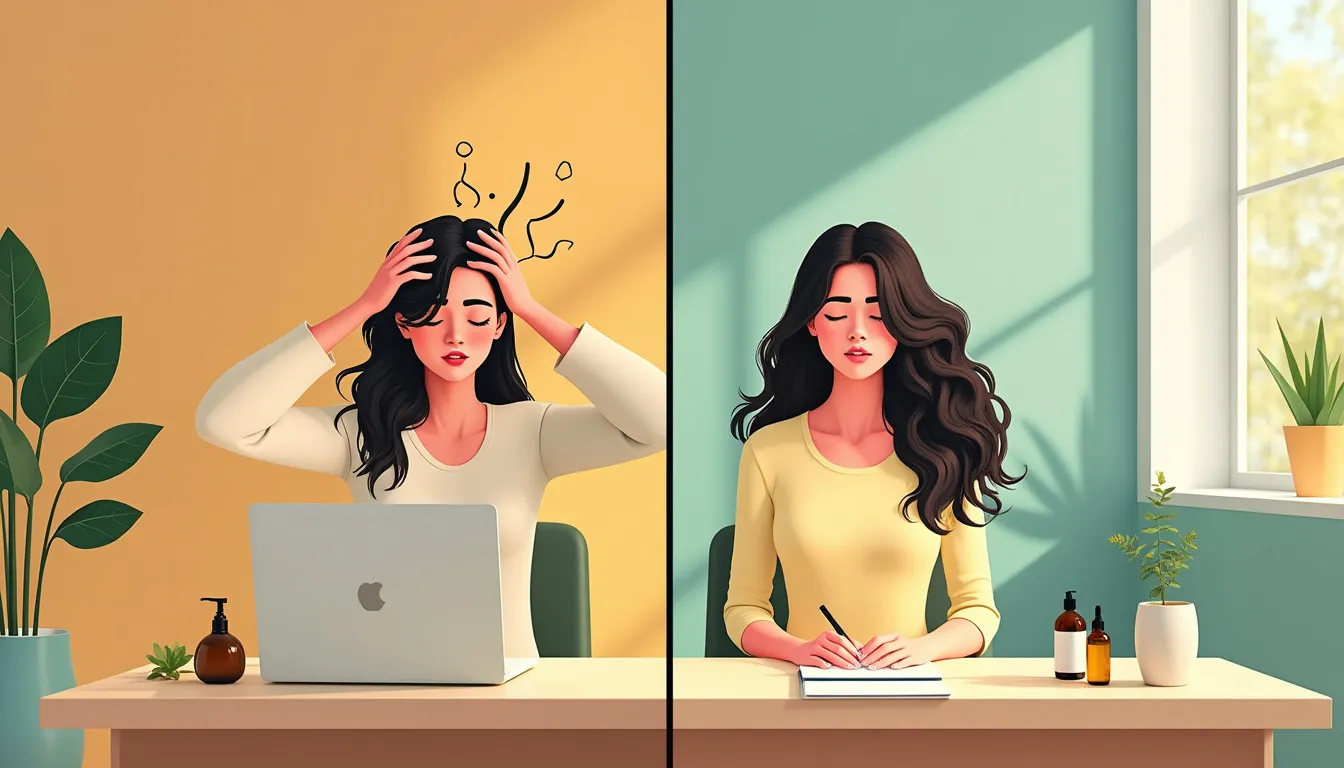Are you noticing more hair in your brush or shower drain lately? You’re not alone. Stress-induced hair loss is a common yet often misunderstood issue affecting millions worldwide. In our fast-paced, high-pressure world, it’s no surprise that our bodies—and our hair—are feeling the strain. But before you start panicking at the sight of your thinning locks, take a deep breath. Understanding the connection between stress and hair loss is the first step towards finding a solution. In this comprehensive guide, we’ll delve into the science behind stress-induced hair loss, explore its various causes, and uncover practical solutions to help you regain your luscious locks. Whether you’re dealing with work-related pressure, personal challenges, or the general chaos of modern life, we’ve got you covered. So, let’s unravel the mystery of stress-induced hair loss together and discover how you can protect your precious strands from the effects of stress. Get ready to say goodbye to hair worries and hello to a healthier, fuller head of hair!
Causes of Stress-Induced Hair Loss
When it comes to our luscious locks, stress can be a real party pooper. Stress-induced hair loss is a common concern that affects millions of people worldwide. But before you start pulling your hair out (pun intended) over this issue, let’s dive into the root causes of this follicular fiasco.
The Science Behind Stress and Hair Loss
Believe it or not, your hair has a secret life of its own. Each strand goes through a complex growth cycle that would rival the plot of a soap opera. This cycle consists of three main phases:
- Anagen (growth phase)
- Catagen (transition phase)
- Telogen (resting phase)
When stress enters the picture, it’s like a dramatic plot twist that throws this delicate balance into chaos. Stress can push more hair follicles into the telogen phase prematurely, leading to a condition called telogen effluvium. It’s like your hair decides to take an unexpected vacation, leaving you with noticeably thinner strands.
But wait, there’s more! Stress also triggers the release of cortisol, often dubbed the stress hormone. While cortisol has its uses, too much of it can wreak havoc on your body, including your hair follicles. It’s like inviting a bull into a china shop – things are bound to get messy.
Types of Stress That Can Trigger Hair Loss
Not all stress is created equal when it comes to hair loss. Various types of stress can lead to your tresses waving the white flag:
- Physical stress: This includes severe illnesses, surgeries, or extreme weight loss. Your body’s like, Whoa, we’ve got bigger fish to fry than growing hair right now!
- Emotional stress: Think major life changes, relationship troubles, or work-related pressure. Your emotions can literally make your hair fall out – talk about wearing your heart on your sleeve (or scalp)!
- Chronic stress: The long-term, day-in-day-out kind of stress. It’s like your hair is stuck in a never-ending game of The Floor is Lava, and eventually, it just gives up.
- Traumatic stress: Sudden, shocking events can cause rapid hair loss. It’s your body’s way of saying, I can’t even deal with this right now.
Understanding these stress types can help you identify the culprit behind your hair loss and take appropriate action. Remember, your hair is smarter than you think – it’s constantly sending you messages about your overall health and well-being.
How Stress Affects Hair Growth Cycles
Now, let’s get down to the nitty-gritty of how stress messes with your hair’s growth cycles. It’s like stress is the ultimate party crasher at your hair’s growth cycle soirée.
Under normal circumstances, about 85-90% of your hair is in the anagen (growth) phase. The rest is either transitioning (catagen) or resting (telogen). When stress barges in, it can disrupt this delicate balance in several ways:
- Premature shifting: Stress can prematurely push hair follicles from the anagen phase into the telogen phase. It’s like your hair decided to skip summer and go straight to winter hibernation.
- Extended telogen phase: Stress can make the telogen phase last longer than usual. Your hair’s basically hitting the snooze button on growth.
- Shortened anagen phase: The growth phase may become shorter, giving your hair less time to reach its full potential length. It’s like your hair’s running a sprint instead of a marathon.
- Disrupted hair follicle cycling: Severe stress can throw off the entire cycle, leading to irregular patterns of growth and shedding. Your hair’s rhythm section is playing jazz when it should be playing pop.
The result? You might notice more hair in your brush, on your pillow, or circling the shower drain. Don’t panic! This type of hair loss is usually temporary, but it can be distressing nonetheless.
Interestingly, stress-induced hair loss often doesn’t show up until 3-6 months after the stressful event. It’s like your hair has a delayed reaction to stress – talk about holding a grudge!
But here’s a silver lining: once the stress is managed, your hair typically returns to its normal growth cycle. It’s resilient like that. However, if stress continues unabated, it can lead to more persistent hair loss issues.
Understanding the causes of stress-induced hair loss is the first step in tackling this hairy situation. By recognizing how stress impacts your luscious locks, you can take proactive steps to protect your crowning glory.
Remember, your hair is not just a fashion statement – it’s a barometer of your overall health and well-being. So, the next time you’re feeling stressed, take a deep breath and show your hair some love. Your follicles will thank you!
Struggling with stress-induced hair loss? Don’t let it stress you out even more! Check out this amazing program designed to help stop hair loss in its tracks. Your future self (and your hair) will thank you!

Solutions and Treatment Options for Stress-Induced Hair Loss
If you’re experiencing stress-induced hair loss, don’t despair! There are numerous solutions and treatment options available to help you regain your luscious locks and boost your confidence. Let’s dive into some effective strategies to combat this common issue.
2.1. Stress Management Techniques
Addressing the root cause of your hair loss – stress – is crucial. Here are some proven stress management techniques that can help:
- Meditation and Mindfulness: Regular meditation practice can significantly reduce stress levels. Apps like Headspace or Calm can guide you through simple mindfulness exercises.
- Deep Breathing: Try the 4-7-8 technique: inhale for 4 seconds, hold for 7, and exhale for 8. This can instantly calm your nervous system.
- Exercise: Physical activity releases endorphins, nature’s stress-busters. Aim for at least 30 minutes of moderate exercise daily.
- Yoga: Combining physical postures with breathwork, yoga is excellent for stress relief and overall well-being.
- Journaling: Writing down your thoughts and feelings can help process emotions and reduce stress.
Remember, consistency is key when it comes to stress management. Make these practices a part of your daily routine for the best results in combating stress-induced hair loss.
2.2. Nutritional Approaches to Combat Hair Loss
What you eat plays a crucial role in hair health. A balanced diet rich in certain nutrients can help promote hair growth and strength:
- Protein: Hair is primarily made of protein, so ensure you’re getting enough. Good sources include lean meats, fish, eggs, and legumes.
- Iron: Iron deficiency can lead to hair loss. Include iron-rich foods like spinach, lentils, and red meat in your diet.
- Biotin: This B-vitamin is essential for hair growth. Find it in eggs, nuts, and whole grains.
- Omega-3 Fatty Acids: These healthy fats nourish hair follicles. Fatty fish, flaxseeds, and walnuts are excellent sources.
- Vitamins A, C, and E: These antioxidants protect hair follicles from damage. Consume a variety of colorful fruits and vegetables.
Consider consulting a nutritionist for a personalized diet plan to address your specific needs in combating stress-induced hair loss.
2.3. Medical Treatments and Hair Restoration Options
If stress management and nutrition aren’t enough, several medical treatments can help with hair regrowth:
- Minoxidil: An over-the-counter medication that can stimulate hair growth when applied topically.
- Finasteride: A prescription medication that can slow hair loss and promote regrowth, particularly in men.
- Platelet-Rich Plasma (PRP) Therapy: This innovative treatment uses your own blood platelets to stimulate hair growth.
- Hair Transplantation: For severe cases, surgical options like FUE (Follicular Unit Extraction) or FUT (Follicular Unit Transplantation) can restore hair.
- Low-Level Laser Therapy: This non-invasive treatment uses light energy to stimulate hair growth.
Always consult with a dermatologist or trichologist before starting any medical treatment for stress-induced hair loss. They can provide personalized advice based on your specific situation.
2.4. Lifestyle Changes to Promote Hair Health
In addition to stress management and nutrition, certain lifestyle changes can significantly impact your hair health:
- Gentle Hair Care: Avoid harsh treatments, excessive heat styling, and tight hairstyles that can stress your hair.
- Quality Sleep: Aim for 7-9 hours of sleep per night. Sleep is crucial for overall health, including hair growth.
- Hydration: Drink plenty of water to keep your body and hair hydrated.
- Reduce Alcohol and Caffeine: Both can contribute to dehydration and nutrient deficiencies that affect hair health.
- Quit Smoking: Smoking can damage hair follicles and accelerate hair loss.
Remember, hair growth takes time. Be patient and consistent with your chosen treatments and lifestyle changes. You may start seeing improvements in a few months, but significant results often take 6-12 months.
While these solutions can be highly effective, sometimes additional support is beneficial. Programs like HairFortin offer comprehensive approaches to hair loss, combining multiple strategies for optimal results. It’s worth exploring such options as part of your overall plan to combat stress-induced hair loss.
In conclusion, stress-induced hair loss is a common but treatable condition. By combining stress management techniques, proper nutrition, medical treatments if necessary, and healthy lifestyle habits, you can effectively combat hair loss and promote healthy hair growth. Remember, everyone’s journey is unique, so don’t hesitate to consult with professionals to find the best solution for your specific needs.
In conclusion, stress-induced hair loss is a complex issue that affects many individuals, but it’s not an insurmountable problem. By understanding the intricate relationship between stress and hair health, we can take proactive steps to protect our precious locks. Remember, our bodies are resilient, and hair loss caused by stress is often temporary.
The key to combating stress-induced hair loss lies in a multi-faceted approach. First and foremost, managing stress through techniques like meditation, exercise, and therapy can significantly reduce the impact on our hair. Coupled with a balanced diet rich in vitamins and minerals essential for hair growth, these lifestyle changes can create a solid foundation for healthier hair.
For those experiencing more severe hair loss, medical treatments and hair restoration options offer hope. However, it’s crucial to consult with a healthcare professional to determine the best course of action for your individual case.
Remember, patience is vital in this journey. Hair growth cycles take time, and it may be several months before you see significant improvements. Stay consistent with your chosen treatments and lifestyle changes, and don’t get discouraged if results aren’t immediate.
Ultimately, addressing stress-induced hair loss is about more than just saving your hair – it’s about improving your overall well-being. By taking steps to manage stress and promote hair health, you’re investing in your physical and mental health.
If you’re looking for additional support in your battle against hair loss, consider exploring programs like HairFortin (https://hairsecurity.net/HairFortin). This comprehensive approach to hair health could be the extra boost you need to regain your confidence and your luscious locks.
Remember, you’re not alone in this struggle. With the right knowledge, tools, and support, you can overcome stress-induced hair loss and embrace a fuller, healthier head of hair. Here’s to your hair health journey – may it be as rewarding as it is transformative!
